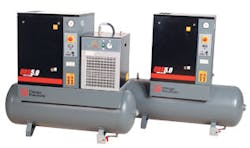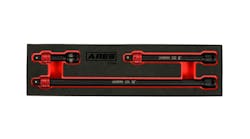Shops use air compressors to power their pneumatic drills, lifts, paint guns, car washes and everything in between. There's no question about it: Air is everywhere.
Now packed with more features than ever, air compressors let techs take on more demanding jobs with more hp, more cfm, more psi and longer run times. From 5 hp to 50 hp, compressor companies have units to suit most needs.
THE FOURTH UTILITY
There are few things as simple — and necessary — as air. And in true form to energy-saving campaigns, compressors are receiving constant upgrades.
"[Manufacturers] have increased the price, but also the competitiveness," said Dana Schrack, vice president of Mi-T-M Corp. "This business is an old business. There are even companies that sell air to the large car manufacturers. They'll go in there and put huge systems in and sell them just like you would buy your electricity and water … that's how important air is these days.
"We have a big plant facility out here, and when we lose an air compressor we're not able to ship products because our lasers depend on air, [as do] all our power tools, assembly lines, etc. — that's why I call it a 'fourth utility.' And I think that some day, this concept of selling air is going to expand in the market."
STOP ALL THE NOISE
So where to start? With so many applications requiring air to function, it pays to compare compressors, see what's out there, and weigh the pros and cons. Typical compressor models include single-stage and two-stage, reciprocating and rotary screw — to name a few.
"Rotary screw compressors are 100-percent duty cycle and operate at much cooler temperatures," said Pat Reilly, national sales administration manager at Kaeser Compressors Inc. "They never need to 'cycle down' and cool off. Plus, most have much lower noise levels, allowing shop owners more flexibility in unit placement and often eliminating the need for special rooms or foundations."
In addition to a quiet run, "Screw compressors have two helical screws that mesh but do not touch — so there are no seals or rings to break down," said Reilly. "Today's screw compressors feature replaceable inlet air and oil filters that help remove contaminants. A little routine maintenance goes a long way in improving air quality and tool life."
Whereas reciprocating models are "your old reliable, been-around-forever compressor," according to Dian Sommers, senior product specialist at Champion/Gardner Denver, she said that "price-wise they're a lot cheaper; noise-wise they're louder."
The price point for these two compressors will vary. However, buyers can generally expect to start at $1,500 for a high-quality, smaller model with reciprocating compressor. Rotary screw models start out at around $4,000 for the same thing.
"There's a big price-point difference here, and that [often] makes a determining factor on what people buy," said Sommers.
THE TWO FACES OF DUPLEX
Tuning already-reliable models to make them more energy efficient, or easier to install, allows manufacturers to stay on the cutting edge.
Just like its name indicates, the duplex unit is two air compressors — two electric motors — on one tank, in one package.
"What happens is you always have a backup," said Sommers. "So if you order a 10 horsepower, you have a five horsepower pump on one side and a five horsepower pump on the other, and when they turn on you've got 10 horsepower of air."
The duplex is "very popular, especially in automotive," said Sommers. "If you only have requirement for five horsepower, only one compressor's running. When that happens you save money. It only turns on both units when there's a requirement for 10 horsepower."
In addition to winning points for being energy efficient, the duplex comes with its own backup. Why run two compressors when you only need one?
CUSTOMIZED COMPRESSORS … ORDER UP!
With so many options, customers can now have it their way. One popular trend is getting the power of a full-grown model in a machine half the size.
"More small shop owners are looking to the compact sizes, like the 30-gallon," said Schrack. "We call them 'squatties.' What we're finding out, and what the industry's adapting to, is that these businesses want smaller, compact units that take up less space in the shop. That's a big feature."
"When it comes to the compressors in the under-25 horsepower range," said Reilly, "customers can now choose from a variety of features such as PC-based controls, frequency drives and integral dryers — convenient, energy-saving options once reserved for large industrial machines.
"Comprehensive air system controllers are another state-of-the-art development that can manage all system components — even those from various manufacturers — while tracking maintenance, operational performance and trends.
"As an added benefit, customers can choose to have their compressors tank-mounted for space saving, or purchase stand-alone compressors and dryers that can be connected to existing tanks."
Even air compressor pumps are receiving upgrades.
"Thanks to the new pump technology, we're finding that they're lasting much longer and delivering more air in the same smaller packages than existed a couple years ago," said Schrack.
Finally, manufacturers are revamping the old compressor by offering it "with everything."
"Our number-one seller is a fully loaded compressor," said Sommers. "You've got your starters already mounted, its vibration isolators, automatic tank drain … [consumers] are buying them where they're already loaded with all the accessories at the factory, so when they get the compressor, all they have to do is plug them in and they run.
"Fully loaded is much easier. It also helps extend the warranty by having all the other features there."
Another benefit to buying fully loaded is that these models generally reduce the amount of moisture in the air. This prevents water from getting into the lines and rusting out tools.
SPECIAL INCENTIVES
When helping techs choose an air compressor, mobile distributors should inquire about the shop's requirements, and play up the various payment and training possibilities that companies offer.
"There is no one-size-fits-all compressor solution," said Reilly. "And selling a customer the wrong equipment for the job could jeopardize the relationship. [Mobile distributors should] get trained in compressed air system design. When in doubt, they can team up with a trained compressed air professional to provide the best customer service."
In purchasing and training, end-users generally want to avoid scratching their head over lengthy set-up instructions. They want to put the equipment to work for them.
"Technicians don't really have time to be working on [air compressors]," said Sommers. "They're hoping their distributor has a service contract who will automatically come by and check out the compressor they purchased. That means tightening the belts or changing the oil, and lots of times on a monthly basis they will come in and do a service check.
"This could be for a reciprocating compressor or it could be for a rotary screw."
Certain manufacturers will bring training in-house or let individuals attend a school for service. Training is also commonly found on company websites, through rep agencies or training videos.
As an added incentive, rebates are sometimes available if a significant amount of energy is being saved.
"When you get into a higher horsepower, such as with rotary screws, the electric companies will give you a rebate for saving electricity because of the efficiency of the motor," said Sommers.
Your average air compressor carries a two-year warranty. And a good compressor will power a shop's tools and equipment for years after that. Help shops feel confident in their next air compressor purchase.
After assessing their needs and offering the best in the industry, point them in the direction of excellent service.
Then watch the results blow you away.


